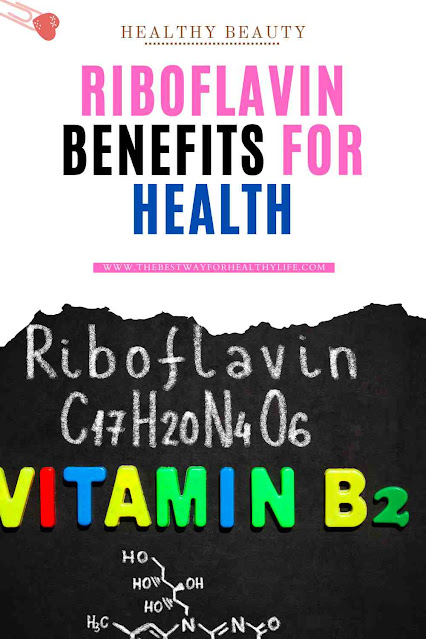Riboflavin Benefits For Health
 |
| Riboflavin Benefits For Health |
What is riboflavin
Riboflavin, also known as vitamin B2, is a supplement to prevent and treat riboflavin deficiency.
In the body, this vitamin plays a vital role in maintaining healthy skin, digestive tract, brain, and nervous system. Riboflavin also helps the formation of blood cells.
Riboflavin Sources
Riboflavin is found in many food and drinks, such as milk, eggs, beef liver, meat, nuts, green vegetables, bread, and cereals.
Apart from natural sources, riboflavin is also available in supplement form. Riboflavin supplements are given to people with riboflavin deficiency who cannot get enough of this vitamin from food.
Riboflavin supplements are often found in combination with other B vitamins. In addition to overcoming vitamin B2 deficiency, this supplement is also believed to be used in treating cataracts, high levels of homocysteine in the blood, and migraines.
However, further research is still needed to ensure its effectiveness and safety.
Riboflavin Benefits For Health
Riboflavin trademarks:
The main benefit of riboflavin is preventing and overcoming riboflavin or vitamin B2 deficiency. This vitamin can be used by adults and children.
Riboflavin for pregnant and lactating women
- Category A:
Controlled studies in pregnant women have not demonstrated a risk to the fetus and a remote possibility of harm to the fetus.
- Category C (if the dose exceeds the RDA):
Studies in experimental animals show adverse effects on the fetus, but there are no controlled studies in pregnant women. Drugs should only be used if the expected benefit outweighs the risk to the fetus.
Riboflavin supplements can be absorbed into breast milk and are known to be safe for consumption by nursing mothers.
Riboflavin benefits can be get in capsules, caplets, effervescent tablets, and syrup.
Precautions Before Taking Riboflavin
There are several things that you should pay attention to before taking riboflavin supplements, including:
- Tell your doctor about any history of allergies you have. Riboflavin supplements should not be given to someone who is allergic to the ingredients contained in this supplement.
- Tell your doctor if you have or currently have hepatitis, cirrhosis, or gallbladder disease.
- Tell your doctor if you take certain medications, supplements, or herbal products.
- Tell your doctor if you are pregnant, breastfeeding, or planning a pregnancy.
- See a doctor immediately if you have an allergic drug reaction or overdose after taking riboflavin supplements.
Dosage and Rules for Using Riboflavin
The dosage of riboflavin varies, depending on the patient's age and intended use. Always consult with your doctor to get the dosage according to your condition.
In general, the dosage for using vitamin B2 is as follows:
Purpose: Overcome the deficiency (deficiency) of riboflavin
- Adults: 5–30 mg per day, in divided doses
- Children: 3–10 mg per day
- Purpose: Prevent deficiency (deficiency) of riboflavin
- Adult: 1–2 mg per day
Purpose: Overcome migraine headaches
- Adult: 400 mg per day
Riboflavin Nutrition Adequacy Figures
Riboflavin needs can be met through food, supplements, or a combination. The recommended nutritional adequacy rate (RDA) varies based on age and health condition.
The following is a description of the daily RDA for riboflavin:
 |
| daily RDA for Riboflavin |
How to Take Riboflavin Benefits For Health
Vitamin and mineral supplements are consumed to supplement vitamin and mineral intake, especially when nutritional information from food is insufficient.
Remember, supplements are only a complement, not a substitute, for nutrition from food.
- Follow the doctor's recommendations and always read the directions for use listed on the supplement packaging. Do not increase your dose without consulting your doctor first.
- Riboflavin supplements in tablet, caplet, and capsule form should be taken with food to increase absorption of this vitamin. Do not chew, grind, or split the supplement, which may affect its effectiveness.
- Dissolve effervescent riboflavin tablets in a glass of water before consuming them. Riboflavin supplements in syrup form need to be shaken before consumption.
- To ensure the dosage is correct, please follow the guideline using the measuring spoon already included in the supplement packaging.
Store riboflavin supplements in a place out of direct sunlight and keep them far from children reach.
Riboflavin Interactions with Other Drugs
The following are several interactions that can be caused by riboflavin supplements when taken with other drugs:
- Increased levels of riboflavin in the body when used with anticholinergic drugs or probenecid
- Decreased riboflavin levels in the blood when used with tricyclic antidepressant drugs or phenobarbital
- Reduced effectiveness of aminoglycoside or tetracycline-class antibiotics
Riboflavin Side Effects and Dangers
If taken according to the recommended dosage, riboflavin supplements rarely cause side effects.
However, if taken in excess, riboflavin supplements can cause diarrhea or make your urine more yellow.
Consult a doctor if these complaints do not subside or worsen, even though the consumption of riboflavin supplements has been reduced.
You should also see a doctor immediately if you have an allergic drug reaction after taking riboflavin supplements.
Post a Comment for "Riboflavin Benefits For Health"